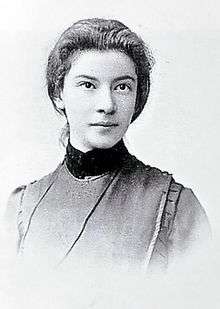Alexandra Brushtein
Alexandra Yakovlevna Brushtein (Алекса́ндра Я́ковлевна Бруште́йн ; nee Vygodskaya ; 11 August 1884 - 20 September 1968) was a Russian and later Soviet writer, playwright, and memoirist.

Life
Brushtein was born in Vilnius as Alexandra Yakovleva Vygodskaya.[1] Her father was Jakub Wygodzki, a doctor and writer. Her mother was Elena Semenovna Vygodskaya (nee Yadlovkina), also from a medical family. Elena's father, Semyon Mikhailovich Yadlovkin, was a military doctor in Kamenets-Podolsky. She graduated from the Bestuzhev Courses. She participated in the revolutionary movement, and was active in the Political Red Cross.
After the October Revolution, she participated in Likbez, the Soviet campaign to eradicate illiteracy. She organized literacy schools in Petrograd, and worked on creating a repertoire for children's theaters. In 1942 she joined the Communist Party of the Soviet Union[2]
She authored more than sixty plays, mostly for children and youth, and adapted classic works such as Uncle Tom's Cabin and Don Quixote under a pseudonym. She would become most famous for her autobiographical series Doroga uxodit v dal' ("The Road Goes into the Distance"):
- The Road Goes Into the Distance (1956)
- At Dawn Hour (1958)
- Spring (1961)
- Flowers of Shlisselburg
- Evening Lights (1963)
She also authored a collection of theatrical memoirs, Pages of the Past (1952).
She died 20 September 1968 in Moscow.
Family
- Husband Sergei Aleksandrovich Brushtein (1873-1947), one of the founders of Soviet physical therapy.[3]
- Son Mikhail Sergeyevich Brushtein (1907-1965), participant in the Great Patriotic War,[4] later chief engineer in a confectionery factory and inventor of techniques for producing confectionery.[5]
- Daughter Nadezhda Nadezhdina (1904-1979), choreographer and ballerina, director of the dance troupe Beroyzka.[6]
- Younger brother Semyon Vygotsky (1892-1956), hydrological engineer.
- Uncle Gavril Efimovich Vygodsky, ophthalmologist and head of the department of eye diseases of the Leningrad Institute for Advanced Studies.
References
- In the birth record in the metric books of the Vilnius city rabbi, available on the website of the Jewish genealogy JewishGen.org, the date of birth is August 11, 1884.
- S.D. Dreyden (1961). "Brushtein Aleksandra Yakovlevna". Theatrical Encyclopedia.
- Izrail Movshevich Brushtein
- M. S. Brushtein on the website «Подвиг народа»
- Soviet patent database
- Alexandra Brushtein "But God... he became completely stupid!"
- A. G. Vygodsky - compiler of the collection "Karl Marx on Art" (2 vols, 1941)
- A. R. Brushtein, Excerpts from the Book of Memories